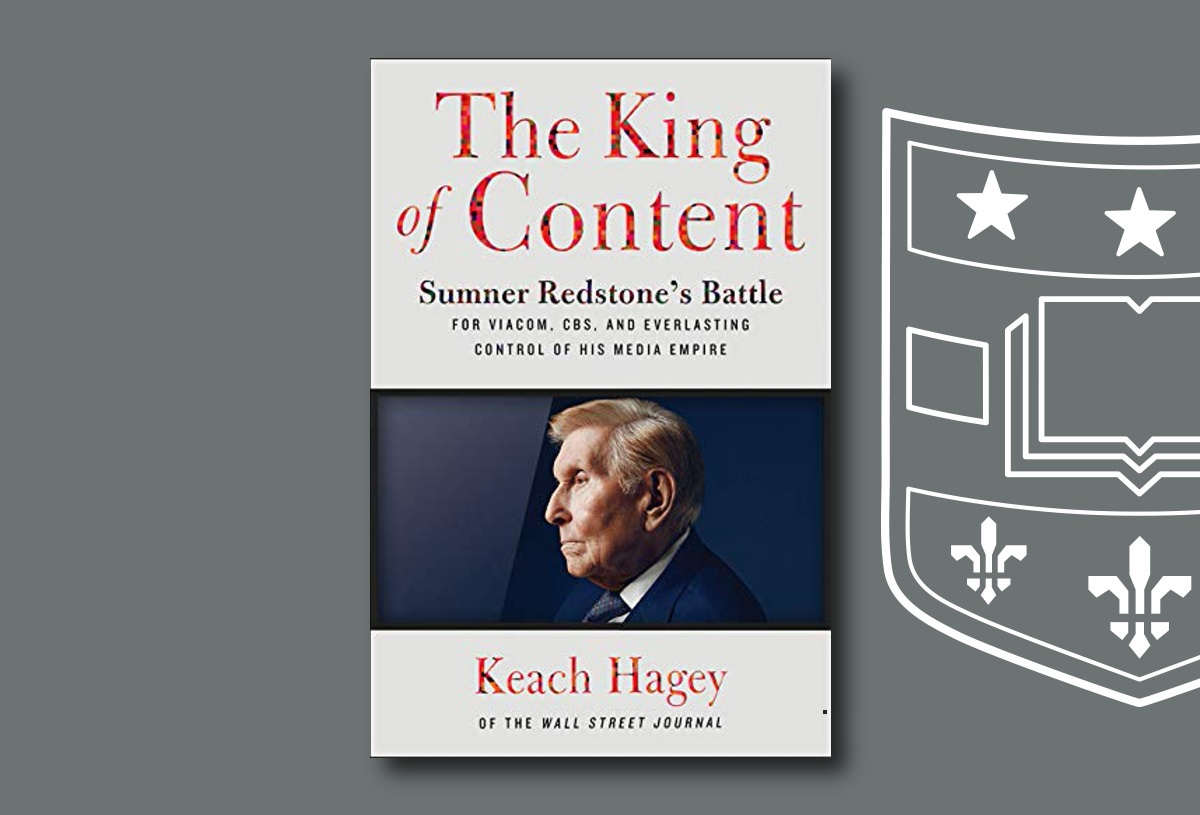Review: Family business lessons from Redstone bio ‘The King of Content’
- August 18, 2020
- By WashU Olin Business School
- 6 minute read

Olin Blog post by Spencer Burke, Koch Center Eugene F. Williams Jr. Executive in Residence.
See more of Burke's reviews and articles on his page at the St. Louis Trust. Burke takes another look at this 2018 book—a tutorial on the exercise of corporate control of both private and public companies—a week after Sumner Redstone’s death on August 11, 2020.
Keach Hagey’s book, The King of Content—Sumner Redstone’s Battle for Viacom, CBS, and Everlasting Control of His Media Empire (2018), tells the story of how Sumner Redstone parlayed National Amusements, Inc., the movie theater business (initially, drive-in movie theatres) developed by his father, into a multi-billion dollar media empire controlling Viacom, Paramount and CBS.
Along the way, Redstone became known as one of the wiliest dealmakers in Hollywood and a feared adversary in the world of corporate take-overs. It is quite a tale of corporate and family intrigue and perfect for Wall Street “deal” junkies and family business owners.
The book is very well researched and contains a lot of new information and insights not covered in the previous accounts of this saga in Vanity Fair and The Wall Street Journal. Redstone was hardly “self-made” (as he often suggested), but his career trajectory is still extraordinary and entertaining to read about.
Wresting ownership from family
He spent a lifetime wresting ownership of his family’s business away from his brother and his kids, his own grandchildren, his several wives and from any other family member who exhibited weakness, including his own son, Brent.
He ignored his father’s wish that the business he built would remain a family business. In the process of accumulating 80% control of the business, he faced years of litigation to resolve accusations of self-dealing, conflicts of interest, fraud and even tax evasion.
Family business owners can learn a lot from this book about good corporate “hygiene,” i.e., the mechanisms needed to avoid loss of control of a family business from death, disability or divorce.
Sumner faced all these threats and still managed to come out on top. Along the way, you will learn about the importance of trusts, pre-nup agreements, health care powers of attorney, incapacity clauses and voting trusts to retaining control of your business. An important lesson of this book is that every control mechanism has its limits and why just owning the majority of stock in a company may not be sufficient protection from the risk of loss of control.
Outflanking Redstone’s paramours
Sumner’s ultimate weapon to maintain control of his empire was an Irrevocable Voting Trust that vested perpetual control of National Amusements in the hands of a few of his trusted business advisors in the event of his death or incapacity.
His daughter, Shari, ultimately, was able to take control of (or “defang”) the voting powers in the trust and prevent the loss of control to those non-family outsiders. To do this, she also needed to outflank the two paramours of her father who had become agents on his healthcare power of attorney and reigned supreme over Sumner for several years. How Shari ultimately accomplished all this is quite a tale and the highlight of the book.
Sumner’s control of National Amusements enabled him to take enormous financial risks to stalk his “content” prey in the public markets. Viacom, Paramount and CBS were his most visible conquests but there were many others along the way. There also were some major (and costly) failures (Midway Gaming which resulted in a $500 million loss) and a few significant missed opportunities, including a failed attempt acquire Facebook in its early days.
For three decades, National Amusements has had just under 80% of the voting interest in Viacom and CBS through its ownership of most of their super-voting stock, despite “only” having an 8% or so economic interest in either company.
‘A veritable dictator’
The control of those super voting shares by National Amusements made Sumner a veritable dictator over the governance and strategic direction of both companies. National Amusements’ roughly 8% economic interest in Viacom today has a market value of around $1.2 billion, a fraction of what it was worth at its peak.
Despite his business success, Redstone will never be anyone’s role model for best CEO or father; he is sui generis—an extremely cunning, ruthless and self-centered individual with boundless energy, grit, determination and sexual appetite.
He is wickedly smart, well-educated (Harvard and Harvard law) and motivated to succeed, but what he sought most of all throughout his career was “control” of everything he touched, including family, business, mistresses and all the attendant personal relationships arising therefrom.
The “empire” he still controlled is, contrary to all he set out to do, led by his daughter Shari and not doing particularly well (and this was the case before the COVID-19 pandemic).
Scandal emerges from fire
Redstone’s earned his reputation for grit and determination by surviving the 1979 Copley Hotel fire in Boston. There, to save himself, he climbed out of his third-floor hotel room window, held onto the window frame and sustained burns over 45% of his body before eventually being rescued by the fire department.
It was widely reported at the time that he was sharing the same hotel room with a woman (not his wife) with whom he was having an extra-marital relationship. She also escaped from the same window and was completely nude (and suffered only minor injuries) at the time of her rescue.
As his relevance has faded with his age, Redstone may best be known today as the main character reference for Logan Roy, the dark and controlling CEO of Waystar Royco, a fictitious publicly traded media company, and patriarch of the Roy family media empire featured in HBO’s award winning TV series, Succession.
Roy’s character is, in fact, an amalgam of several public personalities, including Rupert Murdoch, Robert Maxwell and Donald Trump, but the Redstone family story line dominates this popular series. If you are a fan of Succession, you will enjoy this book.
Value destruction
My only disappointment with Hagey’s account of Redstone’s career is its failure to quantify the value destruction over the years that this man’s leadership visited on his other family members and the public shareholders of both Viacom and CBS.
Redstone and his minions, led by his long-time lawyer pal, Philippe Dauman, the former CEO of Viacom, cost his family and the public shareholders of these companies a fortune by extracting excessive “rents” in the form of inflated executive compensation and missed opportunities for both companies in the capital markets. It is remarkable that he has not been held to account for this.
Today, Viacom and CBS, one company once again, are shadows of their former selves in terms of valuation and have lost the competitive advantages they enjoyed in the 1990s and early 2000s. Sumner may have been the “King of Content,” but he failed to exploit fully the two biggest media trends of this century—social media and the digital delivery of content. The moral of this story is that Sumner Redstone is no Rupert Murdoc. He simply stayed at the gaming table too long and lost his edge.
Sumner’s widely proclaimed grand scheme was “to live forever” and, at all costs, prevent his daughter Shari, owner of 20% of National Amusements, from ever becoming CEO of his companies. This is how the book ends:
‘Total control’
“Unable to eat or talk, he communicates via buttons on a table loaded with recordings of his voice from stronger days—’yes,’ ‘no,’ and his favorite, ‘f**k you.’ The man who always wanted total control, who believed in his own abilities above those of anyone else, who vowed to never sell Viacom, who swore he would never die—as of this writing, this man, Sumner Redstone, still draws breath, thanks, perhaps, to a lifetime of healthy eating and, even more likely, his own iron will.
“It is he, not Shari, that owns the majority of the controlling shares in the companies, and so long as he is not declared incompetent, it will be he who must technically decide the increasingly urgent question of whether to merge or sell Viacom or CBS. Because while content may still be king, kings, it turns out, can be bought just like anybody else.” (p. 306)
We can only imagine what Sumner’s father would say today if he knew how his dream for the family business he created had turned out.
When recently asked about what being part of the Redstone family business was like, Shari responded “It’s a dream life, except when it is not a dream life.” What more can be said?
Media inquiries
For assistance with media inquiries and to find faculty experts, please contact Washington University Marketing & Communications.
Monday–Friday, 8:30 to 5 p.m.
Sara Savat
Senior News Director, Business and Social Sciences
